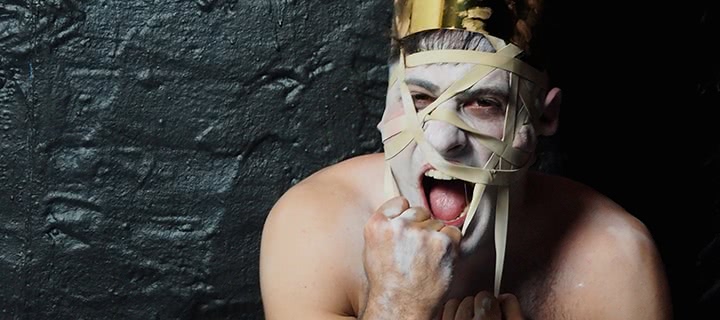Almost 40 years since its premiere, Louis Nowra’sInner Voicesis returning to the stage.
Playing in a perfectly intimate space at the Old Fitz, the piece is an allegory of Nowra’s own struggles told through the character of Russian historical figure Ivan VI.
Imprisoned since infancy, the would-be king has been tortured through deprivation for two decades under the rule of Catherine The Great and is only released in order to be a pawn in a coup. What happens when such a man is installed as a puppet leader and has to learn to rule? And how closely does it tie to Nowra himself?
“[Inner Voices] comes directly from his own experiences as a teenager when he suffered a brain injury and lost the ability to speak,” says director Phil Rouse. “When I spoke to him about the play, he said a lot of this is autobiographical. There’s an allegorical licence taken with Ivan’s ability to learn language and understand grammar. By the end he’s able to form clear sentences. He goes from barely being able to move his tongue to being able to completely formulate reasonably complex ideas and speak as a reigning monarch.”
Unsurprisingly, these issues are likely to be quite confronting for audiences.
“I’d be surprised if it wasn’t,” says Rouse. “It’s a fundamentally tragic play where the audience is invited to go through the suffering of the characters. It’s not like a Greek tragedy where it’s white people in nice clothes talking about how sad stuff is – you actually want to see the tragedy and see the suffering. It’s not a gentle night at the theatre. By the end of it I want the audience to feel like they’re trapped in there with the show.”
20th century Australia is a world away from 18th century Russia, but Nowra’s own context remains a fascinating one for exploration.
“I think it was for the same reason that most allegories work,” Rouse says. “He’s not particularly willing to go into depth about his own work and where this stuff comes from. But if you read his memoir, The Twelfth Of Never, you get a pretty good insight into the horrendousness of his mother and growing up in a very poor area of Melbourne in the ’50s.
“The play is also populated by very eccentric characters, the kind who people probably wouldn’t have believed existed as Australians. Whereas if you set it in Russia, it buys you a bit of licence with that. I think all of these characters are ones he very clearly observes growing up in Fawkner and in pubs.”
Inner Voices was the play that launched Nowra into the public eye – so why the exhumation in 2016?
“We have a really great cast and creative team who were able to investigate and pull it apart,” Rouse explains. “If you’re not really willing to go there both intellectually and emotionally, the work won’t sink. You can’t just do what it says on the page. Not everybody is willing to do that.
“Why now? I think it’s great to be able to do Louis Nowra in his favourite pub, but more politically, it’s a really interesting play about the suffering and abuse that a dominant society is willing to inflict on individuals. I’m not really making parallels to that within the text or my production of it, but it just so speaks of Australia’s treatment of Nauru, asylum seekers, the poor and the indigenous communities. There are a lot of people who are on the wrong end of society and this is showing a grotesque extreme of an idea that keeps those sorts of systems in place.”
[Inner Voices photo by Anna Gardiner]
Inner Voices runsWednesday June 15 – Saturday July 9 at the Old Fitz Theatre.


































